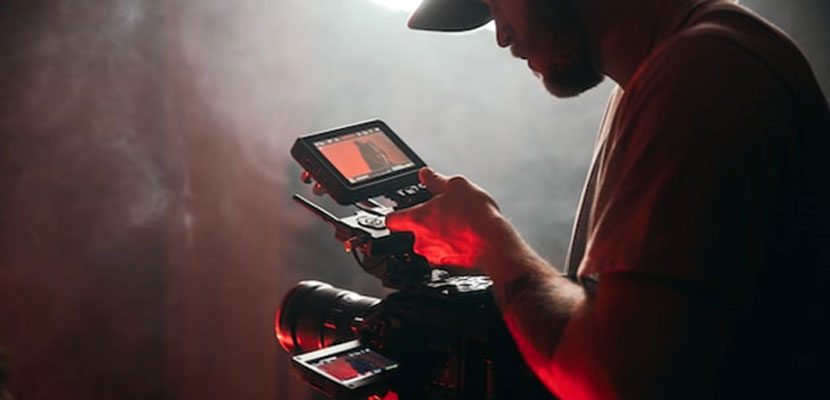Who is a Cinematographer?
A cinematographer is a person who is well-versed and experienced in the job of cinematography. A cinematographer is also called the director of photography (DoP or DP).
If you look at the whole aesthetic or look of a film or any production, the work of a cinematographer is behind it. Of course, the cinematographer works with the lighting and camera crew to achieve what the director wants. But this is one of the most crucial responsibilities on a film set.
These are the responsibilities of a cinematographer:
- Read the script, analyse the screenplay, and decide the filmmaking approach with the director.
- Communicate with the production team on the camera and equipment required to achieve the desired outcome.
- Suggest suitable lighting ideas, angles, filters, and techniques to get what the director desires.
- Visit prospective film locations and take test shots.
- Stay up to date with developments in film industry, expand your network and maintain relationships with professionals.
--> Also read: The Complete Guide to Motion Graphics and Animation
Career in Cinematography

Image Credit: Click Here
If you have an eye for detail and show a good level of creative intelligence, a career in cinematography is the one for you. In addition, a good cinematographer always loves films and the work that goes behind making one.
A cinematography career is an excellent choice since the Indian film industry is proliferating at a pace faster than before – and cinematography job opportunities, too. Moreover, commercial industries with their advertising avenues, live telecast of events and photography prospects always present opportunities to budding cinematographers.
Television shows and broadcasts are also attaining a place in mainstream entertainment industry, which requires fresh talent in cinematographer jobs.
You can take on the following job roles with enough experience and preferably a diploma in cinematography:
- Director of Photography: A DOP visits locations with the director and camera crew to take test shots. They should also communicate the vision pre-production and keep it intact during production and post-production while editing.
- Cameraman: Also called a camera operator, this person physically operates the camera equipment on set according to the instructions of the DOP.
- Editor: The video editor converts the raw footage of film into the final product, keeping in mind continuity, script and instructions given.
- Cinematographer: On smaller sets where budget does not allow assistant camera crew or even a camera operator, the cinematographer fills into these roles to achieve the cinematographic vision.
- Videographer: Videographer may film raw footage on live sets like wedding videography, product videography, cinematic videography etc. They may also have to cover shoots on sets.
- Freelance cinematographer: Often working as a freelancer in this industry is very profitable for the individual cinematographer. Various independent projects often require cinematographers who take up freelance jobs.
The starting salary of a cinematographer in India may be Rs. 94,000 to Rs. 1,00,000 per annum. Depending on experience and the size of the project, on an average a cinematographer makes close to Rs. 1.78 lakhs in India.
--> Also read: The Essential Guide to Digital Marketing
How to Choose a Good Cinematography Course?

Image Credit: Click Here
Now that you know who a cinematographer is and what they do, it is up to you to choose a suitable cinematography course that will provide you with enough knowledge and techniques to thrive in this industry.
Benefits of Joining a film school or an Institution that teaches Cinematography:
- You get to study the technical side of cinematography career.
- It presents you with a network of industry professionals and future coworkers.
- You can strike up employment opportunities while working on projects as part of your course.
Here are a few pointers to keep in mind while choosing a cinematography course:
-
Student-Faculty Ratio
Since cinematography is a very hands-on training experience, large classrooms with huge student populations may not benefit everyone. Instead explore smaller institutions that have a smaller student-teacher ratio.
This helps you get more one-on-one experience and quality time with the instructor.
-
Location of School
Film industry is a very location-specific industry as well. Studying a great film course in a remote area may teach you to be a good cinematographer but does not offer job prospects.
Mumbai, Chennai, Kolkata etc. are some of the most happening places in the country with respect to the film industry. Hence, looking at cinematography courses in Mumbai and other metro cities may be a great way to kickstart your career.
-
Look at the Faculty
As a future cinematographer, you will benefit immensely if the faculty teaching your course has experience working in the industry.
This way you can get access to insider information, advice, industry-relevant information etc. from your classroom itself.
-
Alumni Network
Imagine being able to say that distinguished cinematographers in the industry studied at your institution. But this is not all about bragging.
Having a notable alumni network helps you build connections with people who are active in the film industry. This is important for future employment and career opportunities to find a job as an entry-level cinematographer.
-
Syllabus and Curriculum
Take a look at what the cinematography course teaches at the institution and compare it with the syllabus of other institutions. Any institution that thoroughly teaches the basics and covers the specifics of cinematography at an affordable fee are worth taking.
Light and Composition, Cinematographic Lens and Images, Imaging Techniques, Techniques of Cinematography, Mood Lighting, Digital Imaging Techniques, Media Ethics, Animation and Special Effects are some of the most important contents of a good cinematography course.
--> Also read: Top 5 Careers in Media and Entertainment in 2022
-
Supportive Course Structure
Is the course online or offline? Is the faculty approachable and will they help clear queries and doubts? Is their availability limited?
These are questions you need to consider while choosing a course in cinematography. Often hybrid teaching models help learn better since they offer benefits of hands-on learning and online learning.
Want to Become a Better Cinematographer?

Image Credit: Click Here
Learning cinematography is not a leap away if you find the perfect course located in one of the most happening locations in India – Mumbai.
Aditya Centre of Excellence provides the most suitable option in Cinematography certificate that prepares you to become a Director of Photography/Cinematographer.
This 9-month course is open to any graduates, who have a passion for film and capturing stories within the lens. The course is also certified by the National Skill Development Corporation (NSDC), making it a highly reliable and quality course. It teaches all the essential elements of cinematography complete with a showreel at the end of the course.
The course is offered in the hybrid mode of learning i.e., syllabus is taught with a combination of online and offline methods:
- This gives students all the benefits of online learning.
- Gives them the hands-on learning experience they need.
- Helps them meet instructors on a regular basis and clear doubts and queries.
- Interact with highly experienced faculty who can teach them all about film industry.
With enough experience and practice with technical aspects of shooting, you too can become a cinematographer.


